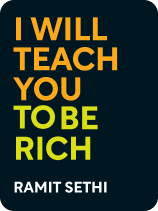

This article is an excerpt from the Shortform book guide to "I Will Teach You to Be Rich" by Ramit Sethi. Shortform has the world's best summaries and analyses of books you should be reading.
Like this article? Sign up for a free trial here .
Are you looking for Ramit Sethi quotes from I Will Teach You to Be Rich? What are some of the most noteworthy passages worth revisiting?
Ramit Sethi is a self-taught expert in personal finance whose goal is to help you cut through the noise of conflicting and overly technical financial advice, get past your own hang-ups around money, and take small steps toward a “rich life”—whatever that looks like for you. To this end, he wrote I Will Teach You to Be Rich—to demystify personal finance management by teaching actionable strategies to those who are just starting their financial journeys.
Below is a selection of Ramit Sethi’s quotes from his book I Will Teach You to Be Rich.
Ramit Sethi: I Will Teach You to Be Rich
In his book I Will Teach You to Be Rich, self-taught expert in personal finance Ramit Sethi distils the basics of personal money management. You’ll learn how to use credit cards wisely, choose the right bank accounts and investment accounts, plan out your spending, and ultimately create a financial system that grows your money automatically.
The following Ramit Sethi quotes highlight some of the key points of his money advice.
“Conscious spending isn’t about cutting your spending on everything. That approach wouldn’t last two days. It is, quite simply, about choosing the things you love enough to spend extravagantly on—and then cutting costs mercilessly on the things you don’t love.”
Spending mindfully means planning your spending in advance. That way, you’ll not only be confident that you’re contributing enough to your savings and investment goals, but you’ll know that any money left over is yours to spend however you want—with zero guilt. Spending mindfully lets you spend extravagantly on the things you love without worrying if you can really afford it (or judging yourself for not saving or investing that money instead).
This approach is all about using your money to create your version of a rich life. For some people, that means going out four times a week; for others, it might mean having a fancy car, traveling often, or founding a nonprofit. Spending mindfully means making your money work for you and your specific goals.
“Why do you want to be rich? What do you want to do with your wealth?”
If you are already making enough money to live comfortably, why do you want to make more? Your first answer might be high-level ideals like “freedom” or “security,” but it’s hard to motivate yourself with abstract ideas. Instead, make the abstract more concrete: Rather than “security,” maybe you want to make more money so you can create college funds for your children or buy the house you’re currently renting. When you focus on a concrete vision, you give yourself a specific goal to shoot for and avoid the trap of making money for its own sake.
“We know that being rich isn’t just about money. We know that most people around us have strong opinions about money yet are clueless with their own.”
As a financial educator, Ramit Sethi has heard every excuse for why his system can’t possibly work for someone because of their individual circumstances. And while there are structural inequalities that give some people an unfair financial advantage over others, the fact that there are some factors you can’t control isn’t a valid reason for ignoring what you can control.
For example, if you work at a minimum wage job, it might be much harder for you to save money than it is for someone with a trust fund. And while you can’t change that unfair advantage, you can decide whether to use it as an excuse not to try or to refocus on whatever factor you can control—even if that’s just something as small as automating your credit card payments so you never face another late fee.
Over the years, Sethi has learned that many people don’t want to hear that logic—they’d rather make excuses than take control of the problem. Most of these excuses fall into two categories: decision paralysis and blaming the system.

———End of Preview———
Like what you just read? Read the rest of the world's best book summary and analysis of Ramit Sethi's "I Will Teach You to Be Rich" at Shortform .
Here's what you'll find in our full I Will Teach You to Be Rich summary :
- The small steps you can take towards living a "rich life"
- How to choose the right bank account and manage your credit cards
- How to create a financial system that grows your money automatically






